PRINCETON, NJ -- While 61% of Americans say the effects of global warming have already begun, just a little more than a third say they worry about it a great deal, a percentage that is roughly the same as the one ÆéûÜǨû§measured 19 years ago.
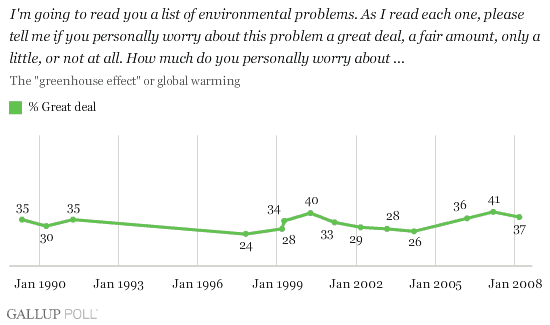
Despite the enormous attention paid to global warming over the past several years, the average American is in some ways no more worried about it than in years past. Americans do appear to have become more likely to believe global warming's effects are already taking place and that it could represent a threat to their way of life during their lifetimes. But the American public is more worried about a series of other environmental concerns than about global warming, and there has been no consistent upward trend on worry about global warming going back for two decades. Additionally, only a little more than a third of Americans say that immediate, drastic action is needed in order to maintain life as we know it on the planet.
These results are from Gallup's annual Environment poll, conducted March 6-9, 2008.
Understanding Global Warming
Eighty percent of Americans say they understand the issue of global warming, a percentage that is up significantly from 16 years ago, when only 53% said they understood the issue.
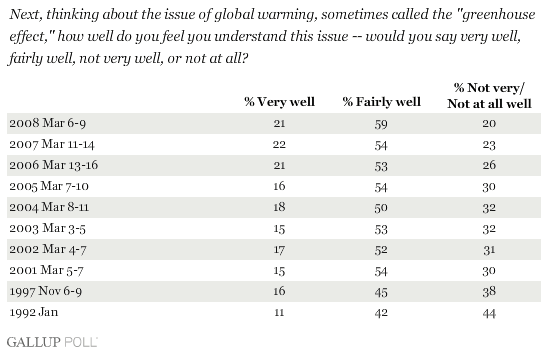
Self-reported understanding of global warming has increased slightly throughout this decade, as measured in Gallup's annual Environment study, from 69% who said they understood global warming very or fairly well in March 2001 to today's 80%. The percentage of Americans who understand global warming "very well" has been steady at a relatively low 21% to 22% for the last three years.
Effects of Global Warming Already Beginning?
Slightly less than half of Americans in 1997 said the effects of global warming had already begun to happen. That number has risen, particularly in the past two years, to the point where today 61% say the effects have already begun to happen at this point in time. About one out of four Americans, however, continue to say the effects of global warming will not happen in their lifetimes, if ever.
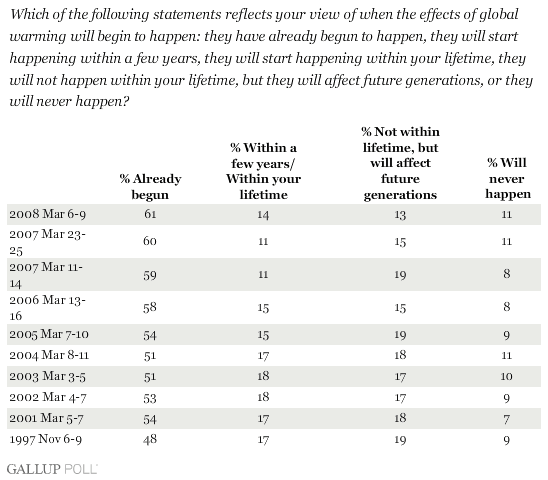
Threat?
There has also been an uptick in the percentage of Americans who say global warming will pose a serious threat to them in their lifetimes, from 25% in 1997 to 40% today.
Even with this increase over the last 11 years, the fact remains that still less than a majority of Americans, at this point, believe global warming will pose a serious threat to them in their lifetimes.
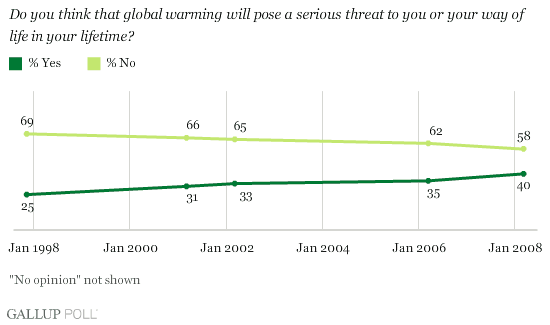
Worry?
The fact that a majority of Americans don't believe global warming will pose a threat to them in their lifetimes makes it perhaps less surprising to find that significantly less than a majority of Americans say they worry a great deal about it. In fact, worry about global warming is low on in the Environment surveys.
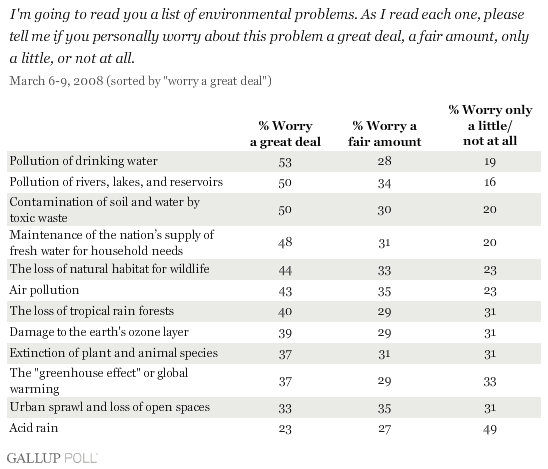
There is, in fact, little more evidence of worry about global warming now than there was when this question was first asked in 1989.
Since that time, there has been change, with the worry a "great deal" percentage rising to 40% in 2000, before dropping back from 2002 to 2004, and now increasing some over the last three years. This year's "great deal" worry number is slightly lower than last year's high to date of 41%.
This is not to say that Americans totally dismiss global warming. About two-thirds say they worry a great deal or a fair amount about it, and only 17% say they don't worry at all about it.
Still, the trend data suggest that despite the growing attention to and emphasis on global warming in recent years, there has been no consistent increase in worry about it since ÆéûÜǨû§began asking the question way back in 1989.
Drastic Action Needed for Environment?
A ÆéûÜǨû§Poll question asks Americans whether "additional, immediate, and drastic action" is necessary concerning the environment, and in this year's update, about a third answer "yes."
That number is down slightly from last year and, stretching back in time, is roughly the same as was measured in a 1995 poll. The only other three years in which ÆéûÜǨû§has measured this variable were from 2001 to 2003, when a slightly lower percentage of Americans advocated drastic action.
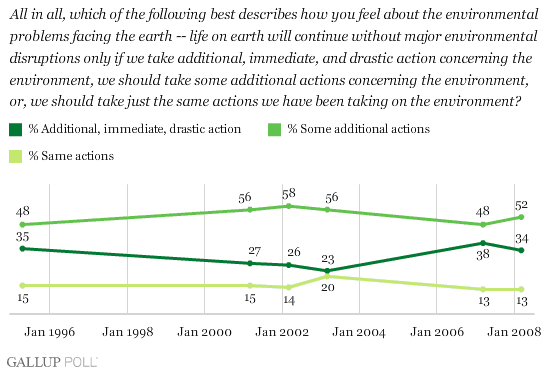
Implications
From a broad perspective, Gallup's data tracking Americans' perceptions of the environment are somewhat mixed. On some dimensions, Americans clearly demonstrate a reaction to the growing discussion and emphasis on global warming in the media and indeed as part of the popular culture. Americans now are more likely than they have been in the past to claim understanding of global warming, to recognize that global warming could be a threat in their lifetimes, and to say the effects of global warming have already begun.
At the same time, however, Gallup's broad measure of worry about environmental issues does not show a concomitant increase in concern. Although there have been fluctuations on this measure of worry over the years, the percentage of Americans who worry a great deal about global warming is no higher now than it was 19 years ago. And the percentage who do worry a great deal -- 37% -- is still well less than a majority, and in fact lower than the percentage who worry a great deal about such environmental issues as pollution of drinking water, pollution of lakes and reservoirs, and toxic waste in the soil.
Survey Methods
Results are based on telephone interviews with 1,012 national adults, aged 18 and older, conducted March 6-9, 2008. For results based on the total sample of national adults, one can say with 95% confidence that the maximum margin of sampling error is ôÝ3 percentage points.
Interviews are conducted with respondents on land-line telephones (for respondents with a land-line telephone) and cellular phones (for respondents who are cell-phone only).
In addition to sampling error, question wording and practical difficulties in conducting surveys can introduce error or bias into the findings of public opinion polls.
To provide feedback or suggestions about how to improve Gallup.com, please e-mail feedback@gallup.com.
